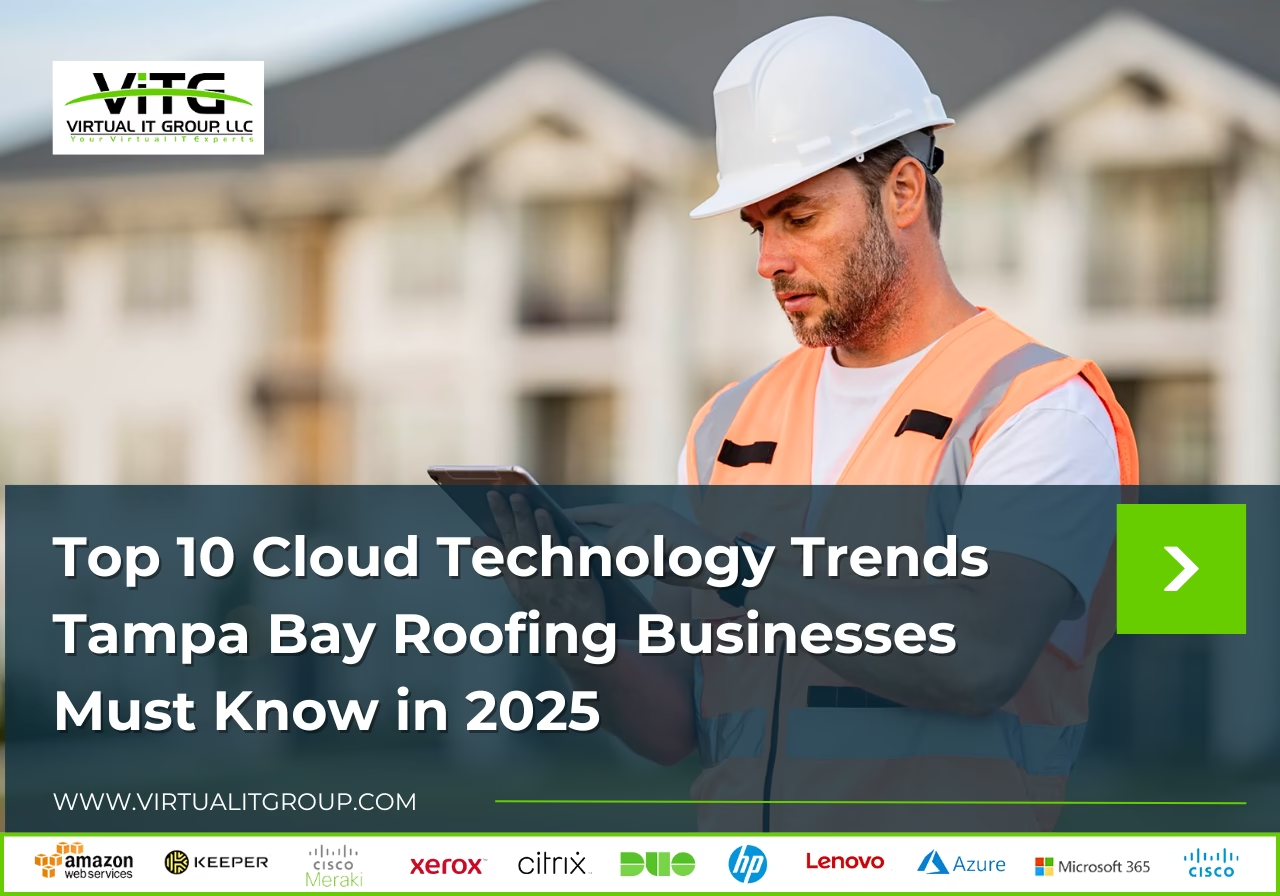In 2025, cloud technology will continue to transform small and medium-sized businesses (SMBs) in Tampa Bay, especially those in the roofing industry. For roofing businesses, the adoption of cloud services is no longer an option but a critical factor for staying competitive, lowering costs, improving collaboration, and boosting operational efficiency. Cloud technology allows businesses to simplify their processes, improve scalability, enhance data security, and encourage growth.
This blog outlines the top 10 cloud technology trends that roofing businesses in Tampa Bay should be aware of in 2025. Understanding these trends and how they can influence your business is important for staying ahead of competitors and preparing for the future.
Table of Contents:
- Introduction: The Importance of Cloud Technology for Roofing Businesses
- The Rise of Multi-Cloud Solutions
- Cloud Automation and AI for Roofing Businesses
- Serverless Computing: A Cost-Efficient Solution
- Cloud Security Innovations to Safeguard Roofing Data
- Cloud-Native Technologies for Scalable Roofing Operations
- Cloud-Based Collaboration Tools for Efficient Teams
- Edge Computing: Enhancing Performance and Responsiveness
- Cloud Data Analytics to Make Better Decisions
- Hybrid Cloud Solutions for Flexibility and Cost Efficiency
- The Role of Cloud in Disaster Recovery for Roofing
- VITG Cloud Technology: Custom Solutions for Roofing Businesses
- Conclusion: Future-Proof Your Roofing Business with Cloud Technology
The Importance of Cloud Technology for Roofing Businesses
Roofing businesses in Tampa Bay face many challenges in their daily operations. From tracking project timelines, managing teams, handling budgets, and maintaining customer satisfaction, it’s easy for tasks to fall behind without the right systems in place. This is where cloud technology trends come in, providing roofing companies with tools to automate processes, access real-time data, and improve communication.
In 2025, cloud adoption will continue to grow in the roofing industry, and recognizing the key cloud trends is vital for staying competitive. The cloud provides businesses with the ability to scale their operations, enhance security, and operate with greater efficiency and flexibility. By applying these cloud technology trends, roofing businesses can set themselves up for sustained success.
1. The Rise of Multi-Cloud Solutions
As more roofing businesses move to the cloud, multi-cloud solutions are becoming more common. Multi-cloud refers to using multiple cloud service providers to distribute workloads across different platforms. This approach helps reduce the risk of a single point of failure and allows businesses to choose the best service for each part of their operations.
In 2025, roofing businesses in Tampa Bay can benefit from multi-cloud’s flexibility and reliability. It offers an opportunity to avoid vendor lock-in, increase cost-efficiency, and improve data redundancy. For example, a roofing company might use one provider for project management tools, another for accounting, and yet another for storing critical business data.
Benefits of Multi-Cloud for Roofing Businesses:
- Reduced Downtime: By using multiple cloud providers, roofing businesses can ensure that operations continue even if one provider experiences an issue.
- Flexibility: Businesses can choose the best cloud services for different tasks, improving overall performance.
- Improved Security: Distributing data across various cloud providers reduces the impact of security breaches.
2. Cloud Automation and AI for Roofing Businesses
Cloud automation, combined with artificial intelligence (AI), will change the way roofing companies operate in 2025. AI-powered cloud services will handle repetitive tasks such as scheduling, invoicing, and communication, enabling roofing businesses to concentrate on customer service and growth.
For example, AI can predict project timelines by analyzing past data, automate financial reports, or even optimize resources based on current and past project requirements. This not only saves time but also reduces the chances of human error and boosts operational efficiency.
How Cloud Automation and AI Benefit Roofing Operations:
- Predictive Analytics: AI can estimate job completion times, material requirements, and delays.
- Task Automation: Automate recurring tasks like invoicing and scheduling to improve workflow.
- Smart Decision-Making: AI analyzes data to help roofing businesses make informed adjustments to their budgets and project timelines.
3. Serverless Computing: A Cost-Efficient Solution
Serverless computing is an increasingly popular trend for roofing businesses in 2025. With this cloud model, businesses don’t have to worry about managing servers or infrastructure. The cloud provider automatically handles backend operations, allowing businesses to focus on their core tasks.
This model is especially useful for small and medium-sized roofing businesses in Tampa Bay that may not have the resources to manage complex server systems. Serverless computing scales automatically according to demand, meaning companies only pay for the computing power they use, making it a cost-effective solution.
Advantages of Serverless Computing:
- Lower Costs: Does not require to maintain physical servers; you only pay for what you use.
- Scalability: Automatically scales to meet demand, ideal for seasonal business fluctuations.
- Enhanced Efficiency: Faster deployment without requiring for managing complex infrastructure.
4. Cloud Security Innovations to Safeguard Roofing Data
Data security remains a top priority for businesses moving to the cloud. In 2025, cloud providers will continue enhancing security measures with tools like end-to-end encryption, machine learning-based threat detection, and multi-factor authentication (MFA) to protect sensitive data.
Roofing businesses in Tampa Bay can rest easy knowing that their critical business and customer data, including contracts and financial records, will be better protected from cyber threats. Cloud security solutions allow roofing companies to ensure their operations remain safe and compliant.
Top Cloud Security Features for Roofing Businesses:
- End-to-End Encryption: Keeps sensitive data secure and private.
- AI-Based Threat Detection: Detects potential security issues in real-time.
- Multi-Factor Authentication (MFA): Adds an extra layer of protection to cloud systems.
5. Cloud-Native Technologies for Scalable Roofing Operations
Cloud-native technologies like containers, microservices, and Kubernetes allow businesses to build applications optimized for the cloud. These technologies help roofing businesses operate with greater efficiency and scalability, ensuring systems are capable of handling increased workloads as the business grows.
By 2025, more roofing companies in Tampa Bay will adopt cloud-native solutions to enhance their IT infrastructure. These technologies offer faster deployment, scalability, and better overall performance—essential for businesses aiming to stay competitive.
Benefits of Cloud-Native Technologies:
- Faster Deployment: Cloud-native applications can be created and deployed quickly.
- Scalability: As your business grows, these technologies scale with you.
- Resilience: Cloud-native architectures provide enhanced resilience and uptime.
6. Cloud-Based Collaboration Tools for Efficient Teams
Cloud-based collaboration tools like Google Workspace, Microsoft 365, and Slack is vital for roofing businesses. These tools allow teams to communicate and collaborate on documents and projects in real-time, whether in the office or at job sites.
By integrating cloud collaboration tools, roofing companies improve team communication and keep everyone on the same page. Cloud-based collaboration enhances the efficiency of project managers, field teams, and back-office staff alike.
Benefits of Cloud Collaboration Tools:
- Centralized Communication: Easily share updates and collaborate on documents.
- Remote Access: Team members can access the tools from any device or location.
- Improved Project Management: Keeping everything in one place ensures that projects stay on track.
7. Edge Computing: Enhancing Performance and Responsiveness
Edge computing allows data processing closer to the source, reducing latency and improving performance. For roofing businesses in Tampa Bay, edge computing enables real-time monitoring of job sites, allowing teams to respond quickly to changes or issues that arise.
In 2025, edge computing will become more important for roofing companies, particularly as more devices become interconnected. By processing data at the site level, businesses can make faster, more informed decisions on the spot.
Edge Computing Benefits for Roofing Businesses:
- Faster Data Processing: Reduce delays in decision-making and project management.
- Reduced Latency: Improve response times for on-site devices.
- Better Job Site Monitoring: Real-time data helps keep the job site under control.
8. Cloud Data Analytics to Make Better Decisions
Cloud data analytics helps roofing businesses gather and analyze valuable business data. By utilizing cloud-based analytics, roofing companies can gain actionable insights into job costs, resource utilization, and team performance, enabling smarter business decisions.
In 2025, cloud analytics will be essential for roofing companies looking to optimize their operations, reduce costs, and boost profitability. The cloud gives businesses access to real-time data, making it easier to make informed decisions.
How Cloud Data Analytics Helps Roofing Businesses:
- Cost Reduction: Identify opportunities to lower costs and improve efficiency.
- Team Performance: Track team metrics to enhance productivity.
- Customer Insights: Gain a better understanding of customer requirements and preferences.
9. Hybrid Cloud Solutions for Flexibility and Cost Efficiency
A hybrid cloud solution combines both private and public clouds, giving businesses the best of both worlds. Roofing businesses can store sensitive data on a private cloud while using public clouds for tasks like project management and file sharing.
For roofing businesses in Tampa Bay, hybrid cloud solutions provide the flexibility to scale without compromising data privacy or security. This cost-efficient model allows businesses to pay only for the resources they use, optimizing budget allocation.
Hybrid Cloud Benefits for Roofing Companies:
- Flexible Scaling: Easily scale resources up or down based on demand.
- Cost Efficiency: Pay only for what you use, avoiding unnecessary overhead.
- Security: Keep sensitive data protected in a private cloud while using public clouds for other workloads.
10. The Role of Cloud in Disaster Recovery for Roofing
Cloud-based disaster recovery ensures that businesses can quickly restore data and resume operations following a disaster. With cloud disaster recovery services, roofing businesses in Tampa Bay can maintain continuity and minimize downtime after events like system failures or natural disasters.
In 2025, more roofing companies will utilize cloud-based disaster recovery to protect critical business data and reduce the risks associated with data loss.
Benefits of Cloud-Based Disaster Recovery:
- Quick Data Recovery: Recover data and resume operations much faster than traditional methods.
- Secure Backup: Ensure that critical business data is backed up securely.
- Business Continuity: Keep your operations running, even in the face of a disaster.
VITG Cloud Technology: Customized Solutions for Roofing Businesses
At Virtual IT Group (VITG), we understand that roofing businesses in Tampa Bay face unique challenges when it comes to managing operations, security, and data. That’s why we provide customized cloud solutions specifically designed to meet the requirements of every small and medium-sized roofing businesses. Our cloud services not only streamline your workflow but also ensure your business stays secure, compliant, and ahead of the competition.
In today’s fast-paced environment, cloud technology is a game-changer for roofing companies, helping them operate more efficiently while keeping costs in check. With VITG’s customized cloud solutions, your roofing business can take full advantage of the latest innovations in technology, including project management tools, data security, real-time analytics, and more.
What VITG Cloud Technology Can Do for Your Roofing Business:
- Cloud-Based Project Management:
Our cloud-based project management tools give your roofing teams the ability to track progress, share updates, and communicate seamlessly whether they are in the office or on-site. This ensures that projects run smoothly, and deadlines are met without the usual delays caused by poor communication. With everything centralized on the cloud, your teams will always have access to the most up-to-date information and project documents. - Data Security and Backup:
In the roofing industry, client data, contracts, and financial records are critical. With VITG’s cloud security solutions, your sensitive data is encrypted and backed up regularly, protecting it from cyber threats and ensuring business continuity in the event of data loss. We provide 24/7 monitoring and real-time alerts, so you’re always a step ahead of potential risks, and your data remains protected at all times. - Cost-Efficiency and Scalability:
VITG’s cloud solutions are designed to scale with your roofing business. Whether you’re adding new projects, expanding teams, or offering new services, our cloud infrastructure grows with you without requiring for expensive hardware investments or maintenance. This cost-efficient solution allows you to pay only for what you use, giving your business the flexibility to grow without financial strain. - Collaboration and Efficiency:
Our cloud collaboration tools like Google Workspace and Microsoft 365 enable simplified communication and document sharing between your team members, no matter where they are. From proposals to contracts to project timelines, everything is centralized and easily accessible, making work more efficient and less error-prone. With cloud collaboration, your roofing teams can stay organized and focused, reducing delays caused by poor coordination. - Real-Time Data Analytics:
With cloud data analytics, roofing businesses can access critical insights that drive informed decision-making. From tracking job costs to analyzing business performance, our cloud-powered analytics tools help roofing companies identify trends, optimize resources, and improve profitability. These insights enable your business to make smarter decisions that lead to improved operational efficiency and greater business growth.
Why VITG’s Cloud Technology Is Best for Roofing Businesses:
- Customized Solutions for Your Requirements:
Every roofing business has different IT priorities. Whether you’re handling residential or commercial projects, VITG personalize cloud solutions that address your specific challenges. We focus on customization to ensure our cloud technology works for your business goals. Whether you want to robust project management tools or advanced security measures, VITG’s solutions can be precisely designed to fit your business’s requirements. - Local Expertise, Local Support:
Based in Tampa Bay, VITG understands the local market and the unique challenges roofing businesses face. Our support is localized and available whenever you require us, ensuring you have a reliable partner to manage your IT. Whether you require immediate troubleshooting or long-term support, we’re always just a call or message away. - Proven Track Record:
With over 35 years of IT experience, VITG has built a solid reputation for providing reliable and effective IT solutions. Our experience, combined with the latest in cloud technology, ensures your roofing business is always operating at its best. We’ve helped many local businesses optimize their workflows and achieve their business goals, and we’re ready to do the same for you.
Conclusion
The adoption of cloud technology is transforming roofing businesses in Tampa Bay, and 2025 will see even greater advancements. By adopting the top 10 cloud technology trends, roofing companies can boost efficiency, security, and scalability. These trends provide numerous advantages, from reducing costs to enhancing collaboration and ensuring business continuity.
Ready to take the next step? VITG IT Solutions is here to help you implement cloud solutions that optimize your business operations, secure your data, and improve team collaboration.
For further details, maximize our 24/7 web chat or book a FREE 30-minute consultation today to see how VITG’s cloud solutions can make a real difference for your roofing business!
Frequently Asked Questions (FAQs)
What is multi-cloud, and how can it benefit my roofing business?
Multi-cloud refers to using multiple cloud providers for different services, which increases flexibility, reduces downtime, and prevents vendor lock-in.
How does AI automate processes for roofing businesses?
AI can automate tasks such as scheduling, resource allocation, and billing, reducing errors and saving time.
What is serverless computing?
Serverless computing allows businesses to run applications without managing physical servers, providing cost savings and scalability.
Why is cloud security important for roofing businesses?
Cloud security protects sensitive data from cyber threats, ensuring that your roofing business remains compliant and secure.
How does cloud-based disaster recovery work?
Cloud-based disaster recovery ensures that your business can quickly restore data and resume operations after a system failure or disaster.
Can edge computing improve performance on job sites?
Yes, edge computing processes data on-site, reducing latency and improving real-time decision-making, enhancing job site performance.
Can cloud technology assist with customer relationship management (CRM) for roofing businesses?
Yes, cloud-based CRM platforms like Salesforce and HubSpot can help roofing businesses manage customer interactions, track leads, and improve communication with clients, ultimately boosting sales and customer retention.
What are the long-term cost benefits of using cloud services for roofing businesses?
Cloud services eliminate the requirement for costly on-premises infrastructure, reduce maintenance costs, and offer flexible payment models, providing long-term savings compared to traditional IT setups.
How can roofing businesses benefit from cloud collaboration tools during the off-season?
Cloud collaboration tools ensure that roofing teams stay connected and continue to share information, even during the off-season, allowing for ongoing project planning, resource management, and client communication.





